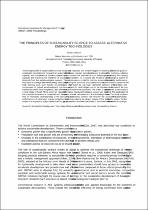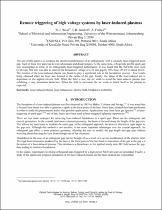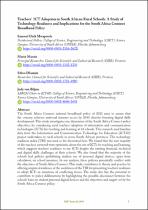JavaScript is disabled for your browser. Some features of this site may not work without it.
- ResearchSpace
- →
- Research Publications/Outputs
- →
- Conference Publications
- →
- View Item
| dc.contributor.author |
Brent, AC

|
|
| dc.date.accessioned | 2009-05-18T13:32:40Z | |
| dc.date.available | 2009-05-18T13:32:40Z | |
| dc.date.issued | 2009-04 | |
| dc.identifier.citation | Brent, AC. 2009. Principles of sustainability science to assess alternative energy technologies. International Association for Management of Technology Conference (IAMOT 2009), Orlando, Florida, USA, 5 - 9 April 2009, pp 15 | en |
| dc.identifier.isbn | 0981581722 | |
| dc.identifier.uri | http://hdl.handle.net/10204/3385 | |
| dc.description | International Association for Management of Technology Conference (IAMOT 2009). Orlando, Florida, USA, 5 - 9 April 2009 | en |
| dc.description.abstract | The emerging field of sustainability science recognizes the important role of technologies in reaching the conditional goals of sustainable development. Research in sustainable technologies requires transdisciplinarity to determine the resilience, adaptive capacity, and complexity of social-ecological systems to assess the potential of such technologies for increasing the carrying capacity and improving the resilience of social-ecological systems, or to assess the resilience of the technological system to demands from the social-ecological systems. This paper introduces a model to prioritize assessable sustainability performance indicators to manage alternative energy technologies following the principles of sustainability science. The model is based on the Kolb learning cycle, and thereby acknowledges the vital need for continual interaction between different entities and components of typical social-ecological systems, where specific technologies are to be introduced, to understand the key interactions within the sub-systems, also termed holons, that need to be assessed. The model is demonstrated with a case study in a rural village of South Africa, where an integrated alternative energy technological system was implemented. The application of the prioritized indicators is compared with the perceived overall performance of the technological system. The study confirms that an increased understanding of the principles of sustainability science may improve the assessment of sustainability performances of alternative energy technological interventions during the design stages of the technology life cycles. Further research is required to adapt conventional technology assessment methods and metrics; recommendations are made accordingly | en |
| dc.language.iso | en | en |
| dc.subject | Sustainability science | en |
| dc.subject | Sustainable development | en |
| dc.subject | Technology management | en |
| dc.subject | Technology assessment | en |
| dc.subject | International Association for Management of Technology Conference | en |
| dc.subject | IAMOT 2009 proceedings | en |
| dc.subject | Alternative energy technologies | en |
| dc.subject | Kolb learning cycle | en |
| dc.subject | Social-ecological systems | en |
| dc.title | Principles of sustainability science to assess alternative energy technologies | en |
| dc.type | Conference Presentation | en |
| dc.identifier.apacitation | Brent, A. (2009). Principles of sustainability science to assess alternative energy technologies. http://hdl.handle.net/10204/3385 | en_ZA |
| dc.identifier.chicagocitation | Brent, AC. "Principles of sustainability science to assess alternative energy technologies." (2009): http://hdl.handle.net/10204/3385 | en_ZA |
| dc.identifier.vancouvercitation | Brent A, Principles of sustainability science to assess alternative energy technologies; 2009. http://hdl.handle.net/10204/3385 . | en_ZA |
| dc.identifier.ris | TY - Conference Presentation AU - Brent, AC AB - The emerging field of sustainability science recognizes the important role of technologies in reaching the conditional goals of sustainable development. Research in sustainable technologies requires transdisciplinarity to determine the resilience, adaptive capacity, and complexity of social-ecological systems to assess the potential of such technologies for increasing the carrying capacity and improving the resilience of social-ecological systems, or to assess the resilience of the technological system to demands from the social-ecological systems. This paper introduces a model to prioritize assessable sustainability performance indicators to manage alternative energy technologies following the principles of sustainability science. The model is based on the Kolb learning cycle, and thereby acknowledges the vital need for continual interaction between different entities and components of typical social-ecological systems, where specific technologies are to be introduced, to understand the key interactions within the sub-systems, also termed holons, that need to be assessed. The model is demonstrated with a case study in a rural village of South Africa, where an integrated alternative energy technological system was implemented. The application of the prioritized indicators is compared with the perceived overall performance of the technological system. The study confirms that an increased understanding of the principles of sustainability science may improve the assessment of sustainability performances of alternative energy technological interventions during the design stages of the technology life cycles. Further research is required to adapt conventional technology assessment methods and metrics; recommendations are made accordingly DA - 2009-04 DB - ResearchSpace DP - CSIR KW - Sustainability science KW - Sustainable development KW - Technology management KW - Technology assessment KW - International Association for Management of Technology Conference KW - IAMOT 2009 proceedings KW - Alternative energy technologies KW - Kolb learning cycle KW - Social-ecological systems LK - https://researchspace.csir.co.za PY - 2009 SM - 0981581722 T1 - Principles of sustainability science to assess alternative energy technologies TI - Principles of sustainability science to assess alternative energy technologies UR - http://hdl.handle.net/10204/3385 ER - | en_ZA |









